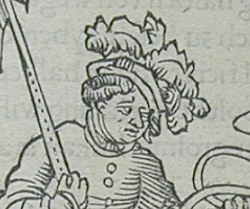|
|
You are not currently logged in. Are you accessing the unsecure (http) portal? Click here to switch to the secure portal. |
Difference between revisions of "Wiktenauer:Main page/Featured"
| Line 63: | Line 63: | ||
<h2> Treatise </h2> | <h2> Treatise </h2> | ||
| − | Please note that only the first edition (1516) has the complete set of illustrations, and all later versions are disorganized and incomplete; this article follows the order of plays and illustrations laid out in the original, and the variant sequences can be viewed on the transcription pages. Egenolff's illustrations are rather different from Paurenfeyndt's, and smaller thumbnails are included where applicable. Furthermore, the illustrations on pages 57 and 59 of the 1516 don't seem to relate to the plays described on 58 and 60, since they show pairs of fencers with dussacks while the text indicates that one of them should be unarmed. They are included here for reference, but the Egenolff illustrations (which are original and not based on Paurenfeyndt) are the ones that seem to depict something similar to the plays as described. While the Twelve Rules for the Beginning Fencer are unillustrated in Paurenfeyndt's work, this presentation includes the illustrations for six of the twelve found in the [[Liber Quodlibetarius (MS B.200)|MS B.200]] (1524) | + | Please note that only the first edition (1516) has the complete set of illustrations, and all later versions are disorganized and incomplete; this article follows the order of plays and illustrations laid out in the original, and the variant sequences can be viewed on the transcription pages. Egenolff's illustrations are rather different from Paurenfeyndt's, and smaller thumbnails are included where applicable. Furthermore, the illustrations on pages 57 and 59 of the 1516 don't seem to relate to the plays described on 58 and 60, since they show pairs of fencers with dussacks while the text indicates that one of them should be unarmed. They are included here for reference, but the Egenolff illustrations (which are original and not based on Paurenfeyndt) are the ones that seem to depict something similar to the plays as described. While the Twelve Rules for the Beginning Fencer are unillustrated in Paurenfeyndt's work, this presentation includes the illustrations for six of the twelve found in the [[Liber Quodlibetarius (MS B.200)|MS B.200]] (1524). |
| − | |||
| − | |||
([[Andre Paurenfeyndt|Read more]]…) | ([[Andre Paurenfeyndt|Read more]]…) | ||
Revision as of 19:39, 15 July 2021
| Andre Paurenfeyndt | |
|---|---|
 | |
| Occupation |
|
| Nationality | German |
| Patron | Matthäus Lang von Wellenburg |
| Movement | Liechtenauer Tradition |
| Influences | Johannes Liechtenauer |
| Influenced | |
| Genres | |
| Language | Early New High German |
| Notable work(s) | Ergrundung Ritterlicher Kunst der Fechterey (1516) |
| Manuscript(s) |
MS 963 (1538)
|
| Concordance by | Michael Chidester |
Andre Paurenfeyndt (Paurñfeyndt, Paurñfeindt) was a 16th century German Freifechter. He seems to have been a resident of Vienna, although he mentions in his introduction that he served as a bodyguard to Cardinal Matthäus Lang von Wellenburg (1468 - 1540). In 1516, he wrote and published a fencing manual entitled Ergrundung Ritterlicher Kunst der Fechterey ("Founding of the Chivalric Art of Swordplay"), which Sydney Anglo notes may have been the first illustrated fencing treatise ever published. Little else is known about the life of this master, but he describes himself as a Freifechter and the contents of his book make it clear that he was associated with the tradition of Johannes Liechtenauer. His treatise diverges significantly from the earlier teachings of the Liechtenauer tradition, which may be due to his stated purpose of writing for beginning fencers.
Treatise
Please note that only the first edition (1516) has the complete set of illustrations, and all later versions are disorganized and incomplete; this article follows the order of plays and illustrations laid out in the original, and the variant sequences can be viewed on the transcription pages. Egenolff's illustrations are rather different from Paurenfeyndt's, and smaller thumbnails are included where applicable. Furthermore, the illustrations on pages 57 and 59 of the 1516 don't seem to relate to the plays described on 58 and 60, since they show pairs of fencers with dussacks while the text indicates that one of them should be unarmed. They are included here for reference, but the Egenolff illustrations (which are original and not based on Paurenfeyndt) are the ones that seem to depict something similar to the plays as described. While the Twelve Rules for the Beginning Fencer are unillustrated in Paurenfeyndt's work, this presentation includes the illustrations for six of the twelve found in the MS B.200 (1524).
(Read more…)
- Recently Featured:
- Sigmund ain Ringeck – Pseudo-Peter von Danzig – Ridolfo Capo Ferro da Cagli – Antonio Manciolino – Nicoletto Giganti
